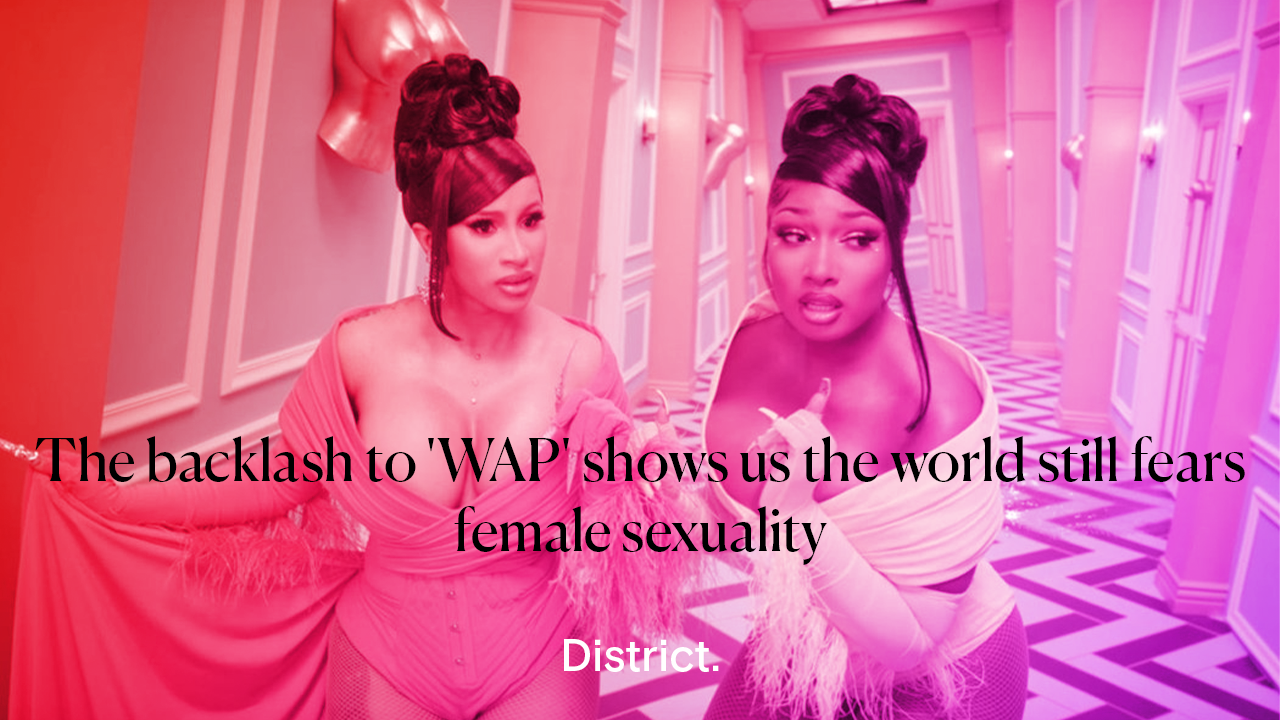The backlash to ‘WAP’ shows us the world still fears female sexuality

The backlash to ‘WAP’ shows us the world still fears female sexuality
The explicit language of ‘WAP’ has caused outrage- but the song is actually a celebration of female sexuality and empowerment.
Cardi B and Megan Thee Stallion, two of the biggest female rappers around, last week released a song together – ‘WAP’. The video has reached over 118 million views on Youtube so far and it’s almost broken the internet with the controversy it’s generated. It shows Cardi and Megan in a mansion, dancing in matching outfits and rapping about their sexual desires.
So why is the song causing so much fuss? Cardi and Megan rap explicitly about sex, as many male rappers do in their songs. Eminem, for example, openly raps about rape and domestic violence in songs like ‘Low Down, Dirty’ or ‘Just Don’t Give A Fuck’.
When nobody bats an eyelid at violent and graphic lyrics coming from men, why is the world still fearful of open female sexuality?
There have been many hot takes online about ‘WAP’, including Ben Shapiro’s uninvited suggestion that a “wet ass p-word” was a “vaginal condition” implying that it meant the women had thrush. His poor wife. Russell Brand has also weighed in on a conversation that he has absolutely no connection to at all.
In a bizarre Youtube video, Brand asked “do we achieve equality by aspiring to the values established by the forces or authors of the hierarchy and system itself…Do women achieve equality by aspiring to and replicating the values that have been established by males?”. By saying this, Brand is somehow suggesting that men invented sexuality and sexual expression. Big fat hardly.
If, however, he is referring to the objectification of women in hip hop music, he should take a closer listen. Hip hop has been known for its misogynistic lyrics and objectification of women since the 1980s. But female rappers like Little Kim, Missy Elliot and Salt-N-Pepa have paved the way for today’s artists by rapping about their own sexual desires. They have been sampling and flipping the sexist narratives of their male counterparts to change the message of the original song. In music, this is called interpolation.
In 1993, Queen Latifa responded to NWA’s ‘A Bitch Is A Bitch’ with her song ‘UNITY’. She opened the first verse saying ‘Who you calling a bitch?’ in the same melody and rhythm as NWA’s version.
Nicki Minaj does the same thing in ‘Anaconda’. Sir Mix-A-Lot’s ‘Baby Got Back’, which we probably all fondly know through Shrek, is heavily sampled throughout Nicki’s song. The original song is basically just about big arses – he shames other women without curves. Take a look at the video below, Mix-A-Lot is literally walking around a set made up of arses.
In the intro of ‘Anaconda’, Nicki mixes Mix-A-Lot’s voice strictly, he says “My anaconda don’t want none unless you got buns hun”. She controls the original message carefully, starting and stopping his voices multiple times. Nicki flips the narrative of Mix-A-Lot’s objectification of women and puts herself as the sexual subject of her own song. She does a the same thing to Biggie’s ‘Just Playing (Dreams)’ in her song ‘Barbie Dreams’.
Megan Thee Stallion took a similar approach in her song ‘Girls In The Hood’. She used the same beat and flow as Eazy E’s ‘Boyz-n-the-Hood’. Eazy E’s song was released in 1987, it says that “the boys in the hood are always hard”.
One verse describes Eazy going home to his girlfriend, slut-shaming and using violence against her;
“Dumb hoe says something that made me mad
…
So I grabbed the stupid bitch by her nappy ass weave”
Megan flips the narrative in ‘Girls In The Hood’ so it is more empowering to women, “the girls in the hood are always hard, ever since sixteen I’ve been having a job”. She also raps openly about her sexuality, talking about receiving head and refusing to fake an orgasm,
“I ain’t lying ‘bout my nut just to make a n**** happy”.
In ‘WAP’, Cardi B and Megan Thee Stallion once again take a sample that was originally misogynistic and flip it to empower women. ‘WAP’s baseline is a loop of Frank Ski’s 1993 single ‘Whores in this House’. The word ‘whore’, similar to ‘bitch’ and ‘slut’ has been reclaimed by female rappers as a term of empowerment. From ‘WAP’s intro, it shares the message of female sexual empowerment.
Female rappers are rewriting original misogynistic songs and creating a new narrative. WAP is one of the many examples of that. It’s a great song with an empowering message. The controversy over it is ridiculous. It’s time for the world to wake up and realise that women enjoy sex just as much as men.
